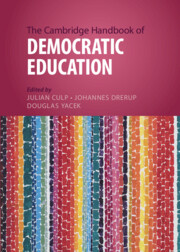Book contents
- The Cambridge Handbook of Democratic Education
- Cambridge Handbooks in Education
- The Cambridge Handbook of Democratic Education
- Copyright page
- Contents
- Contributors
- Acknowledgments
- Introduction
- Part One Historical Perspectives
- Part Two Philosophical and Normative Foundations
- 9 Normative Case Studies as Democratic Education
- 10 Moral Education and Democratic Education
- 11 Rawlsian Political Liberalism and Democratic Education
- 12 Social Justice Education and Democratic Legitimacy
- 13 Critical Theory, Local Moral Perception, and Democratic Education
- 14 Democratic Deliberation in the Absence of Integration
- 15 Education and Democratic Citizenship: Capabilities and Quality Education
- Part Three Key Topics and Concepts
- Part Four Challenges
- Index
- References
11 - Rawlsian Political Liberalism and Democratic Education
from Part Two - Philosophical and Normative Foundations
Published online by Cambridge University Press: 20 April 2023
- The Cambridge Handbook of Democratic Education
- Cambridge Handbooks in Education
- The Cambridge Handbook of Democratic Education
- Copyright page
- Contents
- Contributors
- Acknowledgments
- Introduction
- Part One Historical Perspectives
- Part Two Philosophical and Normative Foundations
- 9 Normative Case Studies as Democratic Education
- 10 Moral Education and Democratic Education
- 11 Rawlsian Political Liberalism and Democratic Education
- 12 Social Justice Education and Democratic Legitimacy
- 13 Critical Theory, Local Moral Perception, and Democratic Education
- 14 Democratic Deliberation in the Absence of Integration
- 15 Education and Democratic Citizenship: Capabilities and Quality Education
- Part Three Key Topics and Concepts
- Part Four Challenges
- Index
- References
Summary
Within liberal societies, citizens endorse a range of religious, moral, and philosophical views (e.g., Buddhism and utilitarianism). Despite this doctrinal diversity, John Rawls’ account of political liberalism holds that there is a form of democratic equality that is realizable by all citizens. Citizens can be equally politically autonomous if they enjoy equal political power and justify the exercise of that power with public reasons. A political liberal education for democratic citizenship would teach students how to participate in political decision-making, and how to use public reasons when helping to decide fundamental political questions. Political liberalism also can accommodate diverse educational options for families, but this accommodation is limited by political liberalism’s concern for the future political autonomy of students. This concern distinguishes the political liberal account from the “convergence” account of public justification. Unlike political liberalism, the convergence account fails to respect adequately the future political autonomy of students.
Keywords
- Type
- Chapter
- Information
- The Cambridge Handbook of Democratic Education , pp. 160 - 177Publisher: Cambridge University PressPrint publication year: 2023

